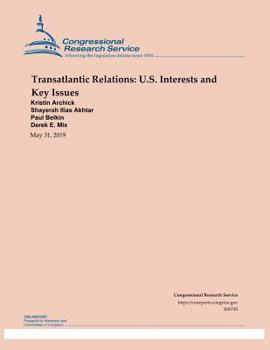Transatlantic Relations: U.S. Interests and Key Issues
For the past 70 years, the United States has been instrumental in leading and promoting a strong U.S.-European partnership. Often termed the transatlantic relationship, this partnership has been grounded in the U.S.-led post-World War II order based on alliances with like-minded democratic countries and a shared U.S.-European commitment to free markets and an open international trading system. Transatlantic relations encompass the North Atlantic Treaty Organization (NATO), the European Union (EU), close U.S. bilateral ties with most countries in Western and Central Europe, and a massive, interdependent trade and investment partnership. Despite periodic U.S.-European tensions, successive U.S. Administrations and many Members of Congress have supported the broad transatlantic relationship, viewing it as enhancing U.S. security and stability and magnifying U.S. global influence and financial clout. Transatlantic Relations and the Trump Administration The transatlantic relationship currently faces significant challenges. President Trump and some members of his Administration have questioned the strategic value and utility of NATO to the United States, and they have expressed considerable skepticism about the fundamental worth of the EU and the multilateral trading system. President Trump repeatedly has voiced concern that the United States bears an undue share of the transatlantic security burden and that EU trade policies are unfair to U.S. workers and businesses. U.S.-European policy divisions have emerged on a wide range of regional and global issues, from certain aspects of relations with Russia and China, to policies on Iran, Syria, arms control, and climate change, among others. The United Kingdom's pending departure from the EU ("Brexit") also could have implications for U.S. security and economic interests in Europe. The Trump Administration asserts that its policies toward Europe seek to bolster the transatlantic relationship by ensuring that European allies and friends are equipped to work with the United States in confronting the challenges posed by an increasingly competitive world. Administration officials maintain that the U.S. commitment to NATO and European security remains steadfast; President Trump has backed new NATO initiatives to deter Russian aggression and increased U.S. troop deployments in Europe. The Administration also contends that it is committed to working with the EU to resolve trade and tariff disputes, as signaled by its intention to launch new U.S.-EU trade negotiations. Supporters credit President Trump's approach toward Europe with strengthening NATO and compelling the EU to address U.S. trade concerns. Critics argue that the Administration's policies are endangering decades of U.S.-European cooperation that have advanced key U.S. geostrategic and economic interests. Some analysts suggest that current U.S.-European divisions are detrimental to transatlantic cohesion and represent a win for potential adversaries such as Russia and China. Many European leaders worry about potential U.S. global disengagement, and some argue that Europe must be better prepared to address both regional and international challenges on its own.
Format:Paperback
Language:English
ISBN:1072542862
ISBN13:9781072542865
Release Date:January 1
Publisher:Independently Published
Length:32 Pages
Weight:0.22 lbs.
Dimensions:0.1" x 8.5" x 11.0"
Customer Reviews
0 rating





